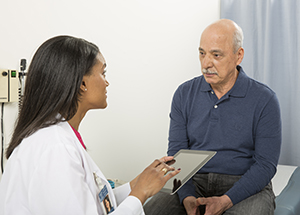Treating Hepatitis C Virus (HCV)
Hepatitis C may not cause symptoms for years. Or it may cause weight loss and fatigue right away. If it's not found early, it can cause advanced disease and complications of cirrhosis. It's usually found when routine liver tests are abnormal and your doctor orders follow-up tests to see why. They will order an HCV antibody test. If that test is positive, a follow-up test will look to see if there is live virus in your blood. After HCV is found, you need to be checked for liver scarring. This is often done with scans such as an abdominal ultrasound. And you may have blood tests.
HCV can be a short-term (acute) or long-term (chronic) illness. Infected children usually become clear of the virus without treatment. Adults most often get chronic HCV and will need medicines. New medicines have turned HCV into a curable disease in over 95% of cases. Acute hepatitis C is often treated with bed rest and supportive care. If HCV is not cleared on its own and becomes chronic, you will be offered treatment. With new treatments, chronic HCV can be cured in most people. But even after it is cured, you can still get it again.
Take these steps
To help keep your body strong and maybe ease symptoms:
-
Don't stress your liver. Don’t use alcohol or any unneeded medicines. Your doctor may advise a lower dose of common pain medicines like acetaminophen or nonsteroidal anti-inflammatory drugs (NSAIDs) like ibuprofen. Always check with your doctor first before you take any over-the-counter medicines or supplements.
-
Eat a balanced diet. A diet low in fat, high in fiber, and full of fresh fruits and vegetables helps you stay healthy. It can also improve your liver's health. Limit salt, sugar, and fried foods. Work with a registered dietitian to make a diet plan that is right for your condition and meets your needs.
-
Stay at a healthy weight, and control any other health problems. You want to avoid extra stresses to your liver, such as a fatty liver. A fatty liver plus HCV liver disease is worse than either disease alone.
-
Avoid alcohol. Alcohol can speed the progress of cirrhosis and end-stage liver disease.
-
Take prescribed medicines. Your doctor will talk with you about the types of medicines that will work best for you. You may need to take medicines to treat HCV for several months or more. Compared with past treatments, new medicines work very well at curing the disease. They have fewer side effects. They are also taken by mouth and for less time.
Follow up regularly
Advanced cirrhosis from HCV requires routine checkups to make sure that no liver cancer develops. If you decide not to take medicines to cure HCV, you will also need regular blood tests. That's because your liver can get worse without your knowing it. Make sure to follow up with your doctor and care team. They can keep track of your condition. Take notes during the appointment. If you don’t understand something, ask questions.

How to prevent the spread of HCV
No vaccine or medicine can prevent the spread of HCV and hepatitis C. It’s up to you to keep others safe.
-
Cover all skin breaks and sores yourself. If you need help, the person treating you should wear latex gloves.
-
Use condoms during sex.
-
Don’t donate blood, plasma, other body tissue, or sperm.
-
Don’t share needles, razors, toothbrushes, manicure tools, nail clippers, or other personal items.
-
HCV can live on surfaces outside the body at room temperature for days. Clean any blood spills using 1 part household bleach with 10 parts water. Wear gloves when you clean.
-
Talk with your doctor about joining a support group.